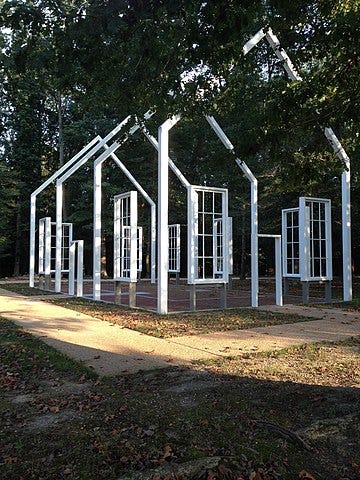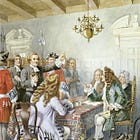“I am a son of prayer, like my namesake, Samuel the prophet, and my mother called me Samuel, because, she said,'I have asked him of the Lord.’ This early dedication to God has always been a strong inducement to me to devote myself to Him as a personal act, and the most important blessings of my life I have looked upon as immediate answers to the prayers of a pious mother.”
- Samuel Davies1
That strong Welsh mother trained him up in the nurture and admonition of the Lord. She could only give him a home education of reading and writing, and of course, praying. There was only so much that his poor family could provide for him.
After a public profession of faith in his Delaware church and was admitted to the Lord’s Table, he entered into Samuel Blair’s log-college, located in Pennsylvania, where he received formal schooling. There in that humble and scoffed-at structure he acquired a classical and theological mind that served him throughout his life. Upon completion of his schooling, he was ordained in the New Castle Presbytery. He would soon become known as a man who lived out his school’s motto lux et calor: light and heat.
Two months following his ordination, Davies became ailed with sickness, lost weight and color in his skin. Though smitten, stricken, and afflicted, he stood before the governor, requesting to be allowed to preach at more meeting-houses.
This incalescent zeal carried him even through his wife’s death by miscarriage. Davies did not relent in his preaching the light of the Gospel. He would preach during the day and fight his fever by night.
A year later, Davies received a letter from Hanover County containing a petition signed by the heads of one hundred and fifty families entreating him to become their pastor. He accepted, and went to work straight away.
And immediately his work was met with great acceptance. He thundered from the pulpit not only as an excellent orator but as a minister of the Gospel that raises dead souls to new life. People began flocking from miles around to hear him preach, and in some cases, would travel upwards of 60 miles.
Not long after his pastorate began, Davies requested permission once again to preach at more meeting-houses, this time expanding outside of Hanover. The Episcopalian ministers became enraged at this. “The men, he said, entertained their hearers ‘with languid harangues on morality’ and left out almost entirely ‘the glorious doctrines of the gospel.’”2

Each year of his pastorate he would embark on long preaching tours and assist in the establishment of churches across Virginia. On one occasion, Davies preached to over 2,000 people in the middle of an open field. This was the time of the Great Awakening where thousands of souls were being illuminated to an ardor for the Gospel of Jesus Christ. It was during one of these trips that he assisted in establishing the Briery Congregation along with John Blair Smith. The services would be as simple as reading the Word, preaching the Word, singing the Psalms, and praying.
After 11 years of labor in Virginia, Davies sailed to London to collect money and rally ministerial support from the Presbyterians there. It was on this trip that Davies displayed his piety through his bravery. Though England was thoroughly Episcopalian, King George II made a visit to hear the famed American preacher. During the sermon, the King turned to an advisor to audibly express his liking of Davies. The fiery minister openly addressed the King’s lack of reverence by saying, “When the lion roars the beasts of the forest all tremble; when King Jesus speaks, the princes of the earth should keep silence.” The rest of the service was met with a profound hush.3
When Davies returned to the colony, he gathered together the ministers of the churches he had planted in Virginia. This founded the Synod of Hanover. Its basis of meeting was to protect the Church from attacks caused by the French and Indian War and from the oppression of civil government. They fundamentally believed in the separation of Church and State for the protection of the Church.
This presbytery was founded upon the same simple worship of their Scottish predecessors, and upon the model of church and presbytery planting by Francis Makemie.
In the same year, the President of Princeton College, Aaron Burr Sr., died. He was replaced by his father-in-law and renowned pastor, Jonathan Edwards. Whilst six weeks into office, Edwards died after contracting smallpox. Two bright lights of American Christianity were now gone.
The office was then filled by Samuel Davies. But not even two years after accepting the position, Davies died from a fever. His mother said while next to his casket, “There is the son of prayers and my hopes, my only son, my only earthly supporter. But there is the will of God and I am satisfied.”4
During one of Davies’ long preaching tours, there was a young man who was impacted by his godliness and oratory skills. This young man would, in a way, carry on that same light and heat. Both men would emulate the New Testament apostles. That young man was Patrick Henry.
“And when they had prayed, the place was shaken where they were assembled together; and they were all filled with the Holy Ghost, and they spake the word of God with boldness.” - Acts 4:31
More Like This
Page 44. Southern Presbyterian Leaders: 1683-1911 by Henry Alexander White. First Banner of Truth edition 2000
Page 47 Ibid.
Page 49 Ibid.
Page 53 Ibid.








